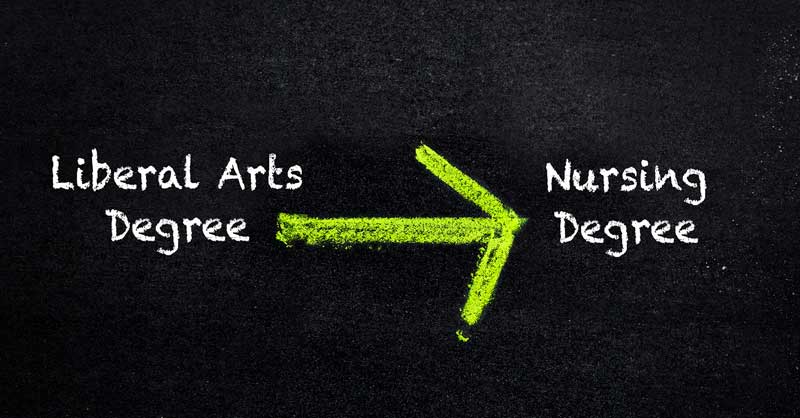How to Become a Nurse with a Liberal Arts Degree
Are you wondering how to become a nurse with a liberal arts degree? The answer could be through an accelerated BSN program. These nursing programs allow you to leverage your liberal arts degree toward your nursing education so that you can graduate on an accelerated timeline.

As individuals, our interests and motivations change over time. Your current ambitions probably look very different from the ones you had entering college. Maybe you once thought a psychology degree was the way to go, but now you’d like to help others in a different capacity. You may be wondering how to become a nurse with a liberal arts degree, as you want to be able to leverage your previous education to propel you into a new profession.
Have you ever heard of a second-degree nursing program, accelerated nursing program or an accelerated BSN track? Essentially, all three focus on transitioning students into the nursing profession. It’s just that nursing schools refer to this same education model differently. But from here on out, we’ll refer to them as accelerated BSN programs.
These accelerated BSN programs are popping up at universities all over the country, serving as a solution for the nation’s mounting nursing shortage. These programs leverage your liberal arts education so you can, in turn, earn a quality Bachelor of Science in Nursing degree in as few as 16 months.
Not So Fast: Prerequisite Courses for ABSN Programs
Accelerated BSN programs come with a series of prerequisite course requirements that must be satisfied before you can start nursing school. While the requirements vary by school, you should anticipate anatomy, chemistry, microbiology and physiology courses being on the list of criteria.

This may feel like your biggest hurdle when looking into how to become a nurse with a liberal arts degree. As a liberal arts major, you probably didn’t dive too deep into the sciences, which means you could spend up to two years completing your prerequisites. It will be important for you to investigate schools with prerequisites that can be completed rapidly — just know that these courses are no walk in the park. While it might seem unnecessary to complete these courses on the surface, your understanding of foundational concepts covered in prerequisites will be vital to your success in more advanced nursing courses.
How ABSN Programs Work
Once you’ve successfully completed your prerequisites, you can expect to jump right into professional nursing study on your first day of accelerated nursing classes. Highly rigorous in nature, accelerated BSN programs comprise three main learning components:
- Core nursing courses set the foundation of your education by focusing on the fundamentals and theories of the profession, from health assessment to ethical practice.
- Nursing skills and simulation labs serve to develop and hone your basic clinical skills, such as catheterization and wound care, as well as your use of clinical judgment in diverse patient scenarios.
- Clinical rotations provide you with real-world nursing experience in diverse areas of practice, from adult care to community health to labor and delivery.
Clinical rotations occur in diverse areas of practice, from acute care to pediatrics, in top-quality healthcare facilities surrounding the program location.
After You Graduate from an ABSN Program
After graduating from an accredited accelerated BSN program, you should be prepared to sit for the National Council Licensure Exam (NCLEX-RN®) with confidence and enter the workforce as a practice-ready nurse.

Upon passing the NCLEX, you’ll have your RN credentials that make it legal for you to practice the profession in any number of settings, such as hospitals, private practices, military bases and urgent care clinics.
Having a BSN also affords you the opportunity to pursue an advanced practice degree at pretty much any point during your nursing career. Some of the best paying nursing jobs are available to registered nurses who hold a Master of Science in Nursing (MSN) degree and some form of specialty certification.
Get Started Today
Now that you know how to become a nurse with a liberal arts degree, we can pair you up with any number of accelerated BSN programs that match your criteria. Simply complete our online form and you’ll soon be contacted directly by those schools for which you qualify. We provide this as a free service. You are not obligated to attend any of the schools that contact you.
